Suppose you’re the chief of police and you have to hire a new hostage negotiator. Are you going to hire someone who genuinely wants to help people and is motivated by strong ethics, or are you going to choose a selfish person with different motives? That’s an easy choice, right? So, why do people behave like the latter during business negotiations?
A master negotiator should always act with the best of intentions. It will be more profitable and do away with a lot of potential headaches in the long run. As a small-business owner, like Marcus says, you are “100% in charge” of the way you run negotiations. Your business intentions should be based on good faith. Not sure where to start? Here are some pointers to help you on your way.

Always Aim For a Positive Outcome
There’s a reason why it’s illegal to sell a home with lead-based paint without disclosing that fact. First of all, it’s dangerous. Secondly, many people wouldn’t purchase a house with a big problem like that if they knew about it beforehand, and getting rid of lead paint comes with a hefty price tag. If a seller hides a safety issue like dangerous paint, they are committing fraud. They are not acting with the best of intentions. They want a quick sale even if people get hurt.
When you think about how your business intentions affect a negotiation, you should aim for a positive outcome where neither party feels as if they have been swindled. You already run an honest, transparent business on a daily basis, so why change into a shark in the boardroom? As Marcus says, “Don’t compromise who you are.”

A great example of this was when Marcus visited a beautiful home decor store in New York. The owner, who was diagnosed as an adult with a form of autism, was an incredible designer but lacked certain people skills to manage his team. Marcus realized this and helped this owner develop a process where he could lean into his artistic strengths while delegating the operational functions of the business to his staff.
Lesson learned? Know who you are, and who you aren’t. In this case, both the owner and Marcus went into the deal with the best of intentions.
When entrepreneurs enter negotiations, there shouldn’t be any outcomes they haven’t planned for. You have to let the other party acquire something they want, so you need to know how much you’re willing to give up. You should also know exactly what concessions you want from them. Negotiation is a success when both parties receive enough good to justify the bad. Or, as Marcus puts it, “The best deals are when both parties that come to an agreement feel just a little uncomfortable.” But, when one party enters into a negotiation with tricks up their sleeve, different motives, or misinformation meant to give them the upper hand, their business intentions aren’t to reach a mutual agreement. They just want to win, and that’s bad business.

The Assumption of Good Faith is in Every Deal
Businesses wouldn’t work if everybody went around backstabbing each other. When entering a negotiation, it’s a safe presumption that both sides want to leave with a closed deal. Both sides need to leave with a victory. How they get to that point is a series of compromises. That’s what makes deals work. Your business intentions should be fair for everybody, and there shouldn’t be any deception. It would be best if you assumed that the other party believes in that, too. Indra Nooyi, former CEO and chairman of Pepsico, says that believing in positive intent is the best advice she ever got.
“Whatever anybody says or does, assume positive intent. You will be amazed at how your whole approach to a person or problem becomes very different. When you assume negative intent, you’re angry. If you take away that anger and assume positive intent, you will be amazed.” (Nooyi, 2008). That’s why having the best of intentions is paramount in negotiations. If either party isn’t coming to the table to reach an agreement, there’s no reason to have a discussion.
When you enter into a negotiation with the other party’s priorities in mind, you will have a better idea of what they are willing to give up. That will help you get what you want. If you are transparent in what assets you are offering, it can help avoid a potential legal case accusing you of operating in bad faith. Your business intentions are closely tied to your reputation, so working in good faith can help you make deals in the future.
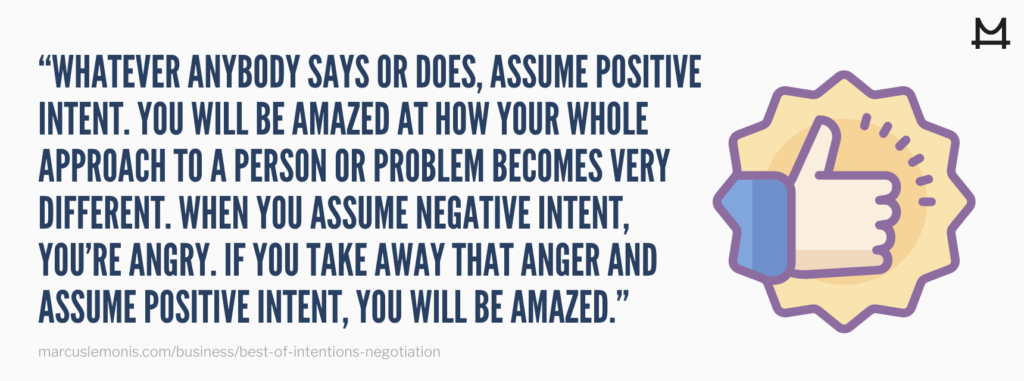
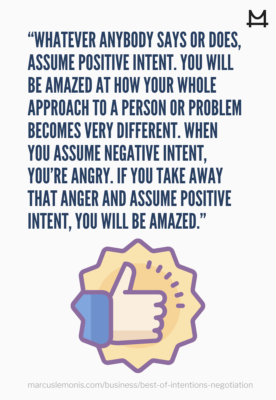
Unfortunately, Not Everybody has the Best Intentions, Here’s 4 Ways to Spot Them
1. Someone With Positive Business Intentions Will Be Courteous of Your Time
If you are starting to feel ignored and the negotiation starts feeling dragged out, start questioning if they have the best of intentions.
2. Be Wary of Dealing With Someone With No Authority
If the person you are negotiating with mentions repeatedly that they have to run decisions up the flagpole, or if they say that their company rules won’t allow them to offer something you want, reassess the situation or ask to speak to someone with more power.

3. Keep Irrelevant Information to Yourself
Some people with the worst intentions will try to coax you into offering up information that they can leverage against you. Be honest about the deal you seek with them, but keep irrelevant or privileged information to yourself.
4. Don’t Let the Goalposts Shift
When you feel like a deal is just about to get locked down, people who aren’t operating with the best of intentions will sometimes move their position at the last minute to get you to make one more concession. That’s why it’s crucial to set clear, achievable business intentions before negotiating occurs. John Golden, CEO of Huthwaite, an international training provider, explained, “If the negotiation is going smoothly and both sides are in it for a win-win outcome, such a demand may be regarded as a dirty trick.” (Nicholas, 2011).
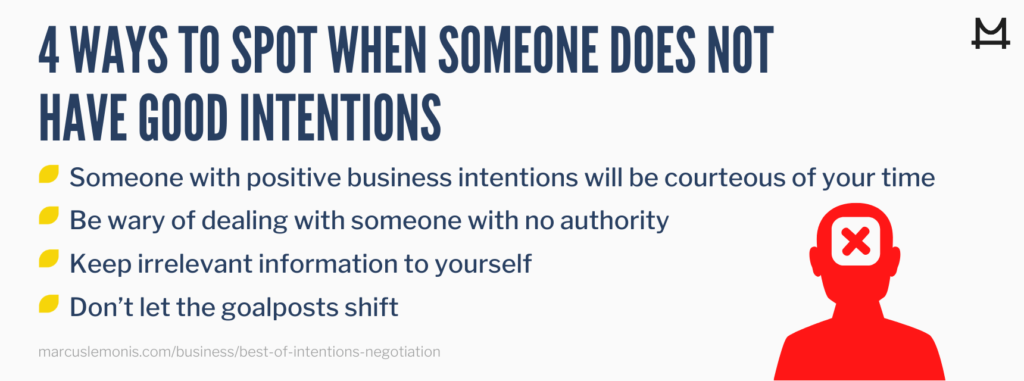
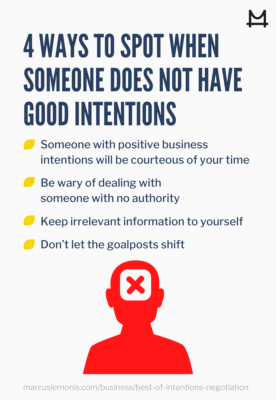
Here are 4 Ways You Can Signal Your Best Intentions
1. Tell the Truth
When asked about the biggest negotiation mistake he’s seen, Marcus responded, “The worst thing you can do in a negotiation, and I see people do this all the time, is to withhold information.” Don’t try to be secretive with relevant information.
2. Be Prompt
People with the best of intentions are eager to make a deal and won’t keep the other party waiting. If you can’t send a detailed response quickly, let the other party know when you will be in touch with them.
3. Have a Clear Goal in Mind and Communicate it at the First Opportunity
Let the other party know what your business intentions are without making them ask. This will let them know that you aren’t messing around, and it will make negotiating faster.
4. Come Prepared for Action
No matter who is negotiating for your company, they should have the ability to say yes or no. When someone without enough power to answer questions shows up to deal, it sends the signal that you aren’t valuing the other company’s time.
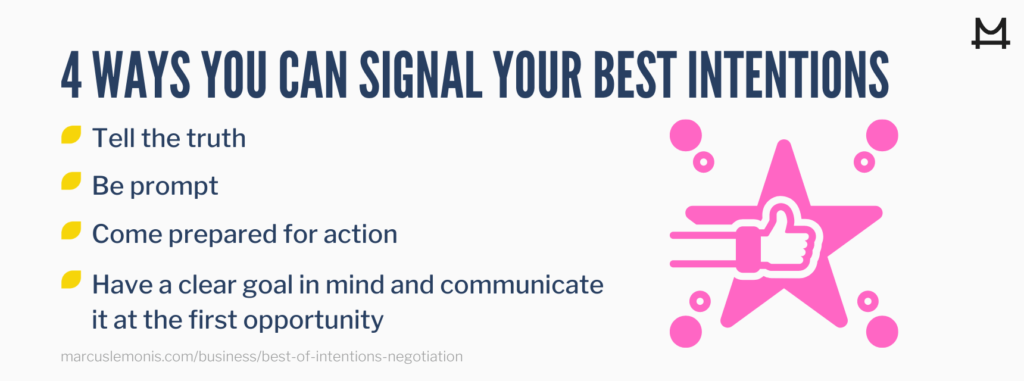
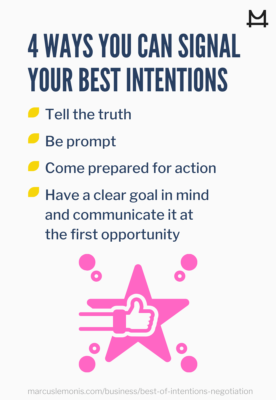
“At the End of the Day, the Numbers Don’t Lie”-Marcus
The tips above can help you identify whether someone has the best of intentions and wants a successful deal, but sometimes a deal just won’t work for both parties. If the numbers don’t work for you, the most courteous and considerate thing to do is to walk away. If you’ve presented yourself as someone who gave it their maximum effort and had the best of intentions the whole time, there shouldn’t be any hard feelings. Be honest about your business needs when you are negotiating, and if you can’t get them, tell the other party the truth. Marcus always says, “People respect you more if they get the truth as opposed to a bunch of fluff.”
- How do you currently recognize others’ intentions?
- Which tips from the above can you leverage to work with best of intentions?
Nicholas, G. (2011, October 11). What CEOs need to know about hardball negotiating.
Retrieved from https://chiefexecutive.net/what-ceos-need-to-know-about-hardball-negotiating/Nooyi, I. (2008, April 30). The best advice I ever got.
Retrieved from https://archive.fortune.com/galleries/2008/fortune/0804/gallery.bestadvice.fortune/7.html





